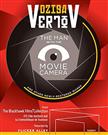Cinema on the Move
by
 All you film students out there might recall Dziga Vertov's name through the half-conscious haze that comes with trudging to an 8 a.m. class. He's right up there with Andrei Tarkovsky and Sergei Eisenstein as Russian cinema's prime movers and shakers, one of those directors you felt forced to like but came to appreciate later upon viewing their work through less petulant eyes. Vertov's specialty involved presenting our world from a madman's perspective, turning the most mundane elements of society into harrowing adventures via the wildest editing and photography tricks that the screen had seen to date. Tossing aside what he felt were fiction's stifling constraints, Vertov established an experimental vision that became one of the silent era's boldest, cementing his rep as a man who'd mastered the power to influence audiences through visuals alone. Flicker Alley's Dziga Vertov: The Man with the Movie Camera set brings together and meticulously restores five of the filmmaker's signature productions...including the one that set an artistic standard for a whole genre.
A man snoozes on a park bench. Babies stir in a hospital nursery. Window washers toil away at towering heights. Projected before both the audience and on-screen crowds, these images are the first we see in 1929's The Man with the Movie Camera, the star attraction of this collection and Sight & Sound magazine's recent pick for the best documentary of all time. But with Vertov standing at the helm, we're not about to witness your average slice of life unfold. With no trained actors, no intertitles, and no plot (save for a spot of minor staging), our director instead trains his trusty lens on everyday people, transforming a series of disconnected scenarios into an experience that won't soon be forgotten. Vertov employs the power of the moving image to jest, provide social commentary, and simply go where his contemporaries and their chiefly static cameras hadn't yet. Footage of a speeding train is captured from beneath the tracks. The filing of a marriage license is intercut with a request for divorce papers. Typewriters, telephones, and cash registers all end up as part of the same glorious mechanical symphony. The fevered pace at which Vertov lays out these sights results in a hypnotic effect, yet we're encouraged to form our own interpretations of what the mess is supposed to mean and given ample room to do so. As every frame buzzes with some form of activity and evokes a gamut of emotions, the film effortlessly gets viewers invested in the world around them, without needing a concrete story. The Man with the Movie Camera is an audacious piece of work that could've only been made by someone well aware of cinema's intoxicating effect and brave enough to use the medium to go anywhere.
Each of the four other features bundled with Dziga Vertov: The Man with the Movie Camera are best described as propaganda, albeit well-made propaganda for the most part. 1925's Kino Pravda is an installment of a newsreel series where Vertov honed his craft, applying a lot of the same techniques he'd utilize in The Man with the Movie Camera to honor the first anniversary of political leader Vladimir Lenin. Communism's founding father is also the subject of 1934's 3 Songs About Lenin, which aims to summarize the man's legacy by examining three folk anthems written in his honor. Unfortunately, aside from displaying the lyrics to these tunes onscreen over footage of Russia's industrious workers, the conceit isn't exploited very well, and Vertov's visual style appears pretty straightforward. 1924's Kino Eye is doubly unfortunate. A documentary following youngsters as they arouse their fellow villagers into helping one another, it's littered with random sequences of time pausing and reversing that serve little purpose. Still, Vertov strikes a powerful chord with 1931's Enthusiasm, wherein he summarizes the efforts of miners to return Russia to economic glory with the help of both his dynamic editing and a romp through the sandbox that is the burgeoning world of sound.
For film historians, enthusiasts, and general nerds like yours truly, Dziga Vertov: The Man with the Movie Camera is a treasure. With grubby and inferior prints having circulated for decades, it's a relief to see Flicker Alley give admirers the most pristine and complete version of the man's best-known work to date, as well as spiffing up some of his other productions for a real "before and after" experience. The audience for Dziga Vertov: The Man with the Movie Camera may be as niche as they come, but those who've been waiting for a lovingly-assembled collection like this won't come away disappointed.
(Dziga Vertov: The Man with the Movie Camera is available on Blu-ray from Flicker Alley.)  |
|
|
|
|
|




